六年级英语上册 Unit 10 My Class Lesson Three重难点讲解 教科版
科普版小学六年级英语上册知识点
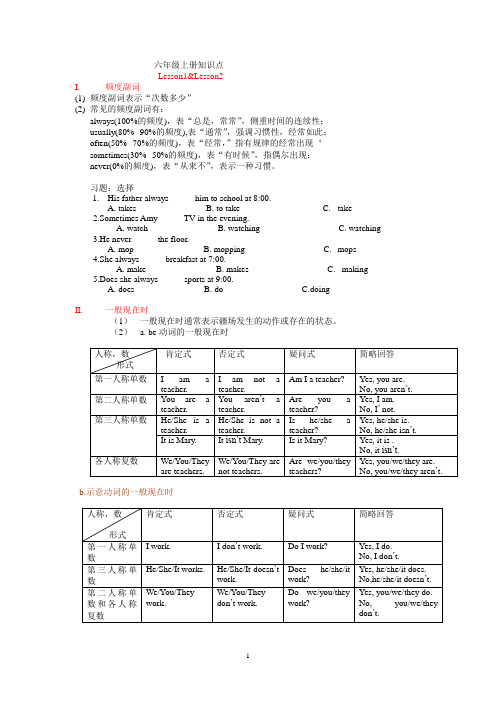
六年级上册知识点Lesson1&Lesson2I.频度副词(1)频度副词表示“次数多少”(2)常见的频度副词有:always(100%的频度),表“总是,常常”,侧重时间的连续性;usually(80%--90%的频度),表“通常”,强调习惯性,经常如此;often(50%--70%的频度),表“经常,”指有规律的经常出现‘sometimes(30%--50%的频度),表“有时候”,指偶尔出现;never(0%的频度),表“从来不”,表示一种习惯。
习题:选择1.His father always _____ him to school at 8:00.A. takesB. to takeC. take2.Sometimes Amy _____ TV in the evening.A. watchB. watchingC. watching3.He never _____ the floor.A. mopB. moppingC. mops4.She always _____ breakfast at 7:00.A. makeB. makesC. making5.Does she always _____ sports at 9:00.A. doesB. doC.doingII.一般现在时(1)一般现在时通常表示疆场发生的动作或存在的状态。
(2) a. be动词的一般现在时b.示意动词的一般现在时小贴士:习题:1._____ you have English class every day?A. DoB. AreC. Can2. My mother _____in a middle school.A. teachB. teachsC. teaches3. She doesn’t _____ her homework in the afternoon.A. to doB. doesC. do4. John usually _____ up at 6:30.A. wakeB. wakesC. waking5. Eve _____ here every morning.A. comeB. goC. comes6. _____ she always come here?A. DoB. DoesC. Is7. I _____ not know.A. amB. canC. do8. ---_____ your sister usually have lunch at twelve?---Yes.A. DoB. DoesC. /9. Does she _____ morning exercises here every day?A. doesB. doingC. do10. He _____ no time.A. haveB. hasC. having1.It’s time _____ lunch.A.forB.toC.in 2.There is something wrong ______ his clock.A.toB.withC.at 3.John usually _____ up at 6:20.A.wakeB.wakesC.waking4.But today he has _____ time.A.noB.notC.isn’t5.His father always _____ him _____ school at 8:00.A.take…forB.takes…toC.take…to6.Ann is happy ____ out with her father.A.goingB.to goC.goes7.______ be afraid, Ann.A.NotB.Can’tC.Don’t8.I have no time _____ morning exercises.A.doB.to doC.doing9.He is always late _____ school.A.forB.atC.of10.Let’s take a walk _____supper.A.afterB.forC.inLesson3&Lesson4I.特殊疑问句(1)特殊疑问句是对句子某一部分提问的句子。
冀教版六年级上册英语Lesson10 How Many Are There
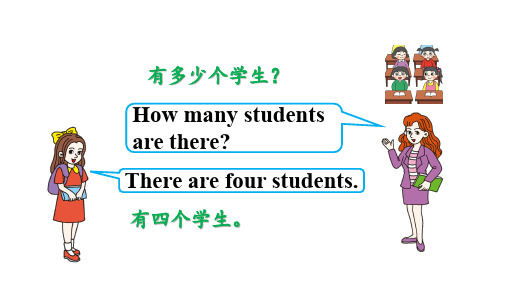
A. boys, watches B. boy, watch
C. boy, watches
5. I can see ten ___A__ in the picture.
A. sheep
B. dog
C. pig
apple_a__p_p_le_s eraser____e_r_asers class____c_la_sses
foot__f_e_e_t _
chilcdh_i_ld__r_e_n_
toothte_e_t_h__
horse _h_o_r_s_e_s dog ____d_o_gs
2.选出正确形式。
1. The girl often brushes her_____ bCefore she goes to bed.
3.tomato-tomatoes potato-poatoes
4.photo-photos
5.man-men woman-women
child-children
名词是人、动物、事物、地方、状态等的名称。
它可以表示具体的东西,也可以表示抽象的东西。
可数名词单数变复数规则:
1. 一般情况加s 2. 以s, sh, ch, x结尾加es,读/ɪz/。 3. 以辅音字母+y结尾,变y为i再加es,读/ɪz/。 4.以辅音字母+o结尾的,有生命加es;无生命加s。 5.以f,fe结尾,去f,fe变ves,读/vz/。
这些单词有s。
2 Boxes and buses
这些单词没有es。
These words have no es.
This is a box.
这是一个盒子。
This is a bus.
这是一辆公共汽车。
六年级上册英语第三课课文人教版
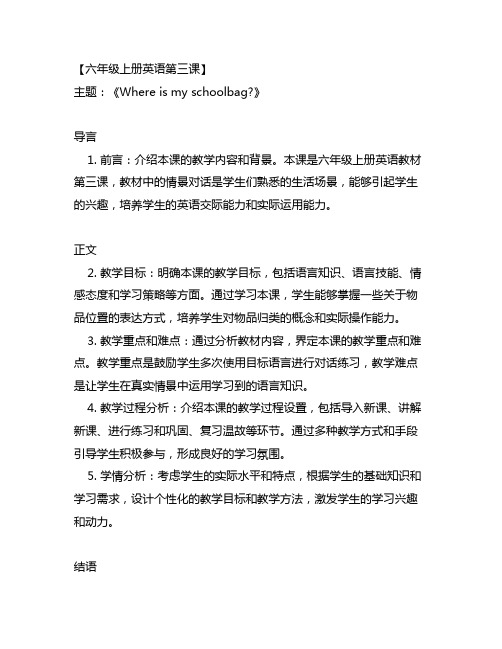
【六年级上册英语第三课】主题:《Where is my schoolbag?》导言1. 前言:介绍本课的教学内容和背景。
本课是六年级上册英语教材第三课,教材中的情景对话是学生们熟悉的生活场景,能够引起学生的兴趣,培养学生的英语交际能力和实际运用能力。
正文2. 教学目标:明确本课的教学目标,包括语言知识、语言技能、情感态度和学习策略等方面。
通过学习本课,学生能够掌握一些关于物品位置的表达方式,培养学生对物品归类的概念和实际操作能力。
3. 教学重点和难点:通过分析教材内容,界定本课的教学重点和难点。
教学重点是鼓励学生多次使用目标语言进行对话练习,教学难点是让学生在真实情景中运用学习到的语言知识。
4. 教学过程分析:介绍本课的教学过程设置,包括导入新课、讲解新课、进行练习和巩固、复习温故等环节。
通过多种教学方式和手段引导学生积极参与,形成良好的学习氛围。
5. 学情分析:考虑学生的实际水平和特点,根据学生的基础知识和学习需求,设计个性化的教学目标和教学方法,激发学生的学习兴趣和动力。
结语6. 教学反思:对本课教学效果进行总结和反思,包括教学方法的得失、学生表现和反馈等方面。
不断改进教学方法,提高教学质量,促进学生的全面发展。
7. 展望未来:展望学生在本课学习的基础上,能够进一步提高英语交际能力和实际运用能力,为学生未来的学习和发展奠定良好基础。
附录8. 参考文献:列出本课教学内容相关的参考文献和学习资料,供教师和学生进一步学习参考。
9. 课堂练习:设计一些与本课内容相关的课堂练习题目,巩固学生所学的知识,检验学生的学习效果。
敬爱的老师、亲爱的同学们:欢迎大家来到今天的英语课堂!在上一节课中,我们学习了关于家庭成员和他们的职业的表达方式。
今天,我们将继续进行英语语言的学习,通过一个有趣的情景对话,学习有关物品位置的表达方式,培养学生的英语交际能力和实际运用能力。
一、教学目标通过本节课的学习,我们的教学目标主要有以下几点:1. 能够掌握一些关于物品位置的表达方式,如in, on, under等;2. 培养学生对物品归类的概念和实际操作能力;3. 提高学生的英语听说能力,能够熟练运用所学内容进行对话练习;4. 培养学生的合作意识和团队精神,通过小组合作练习,促进学生之间的互动和交流。
苏教版六年级英语上册Unit重点

苏教版六年级英语上册U n i t重点TTA standardization office【TTA 5AB- TTAK 08- TTA 2C】U n i t 4一、单词1.以前 ago2.使用use3.电话 telephone4.办公室 office5.手机 mobile phone6.随处,到处 anywhere7.收音机 radio 8.报纸 newspaper9.新闻 news 10.观看 watch11.电子书 e-book 12.仍然 still13.拼写 spell 14.昨天 yesterday二、词组1.过去和现在 then and now2.六年前 six years ago3.不会写字 could not write4.做很多事情 do many things5.二十年前 twenty years ago6.写信给他的朋友们 write letters to his friends7.用电话机给人打电话 use the telephone to call people8.家里和办公室的电话机 the telephone at home and in the office9.一部手机 a mobile phone10.随处给人打电话 call people anywhere11.写电子邮件 write emails12.他也写电子邮件 He also writes emails.(=He writes emailstoo .)13.三十年前 thirty years ago14.迈克的爷爷 Mike’s grandpa15.听收音机 listen to the radio16.看报纸获取新闻 read newspapers for news17.阅读和观看新闻 read and watch news18.在网上 on the Internet19.看电子书 read e-books20.在学校交朋友 make friends at school21.从商店里买东西 buy things from shops22.全世界 all over the world23.来自世界各地的网友 e-friends from all over the world24.在网上购物/网购 do shopping on the Internet25.贴两张照片 stick two photos26.努力工作 work hard27.每天 every day28.我的表弟 my cousin29.在度假 on holiday30.美国人(复数) the Americans (口诀:中日不变,英法变,其余+s)31.发明飞机/火车 invent the aeroplane/train32.英国人 the British/the Englishmen33.一节英语课 an English lesson34.朝窗外看 look out of the window35.听我说 listen to me36.继续 go on37.今天是星期几 What day is today=What day is it today38.你会拼写它吗 Can you spell it39.40.变得生气 get angry41.用“鸡蛋”造一个句子 make a sentence with ‘egg’42.吃一块蛋糕 eat a cake43.“鸡蛋”在哪儿44.Where’s the ‘egg’45.46.等待答案 wait for the answer47.复习一般过去时 review the simple past tense.48.一岁 one year old49.三岁 three years old50.贴一张你自己的照片 stick a photo of yourself51.比较过去时和现在时/抚今追昔 compare the past with the present三、第四单元知识点梳理1、一般过去时情态动词的句型转换:(1)could引导的一般过去时的否定句,在could之后加not:couldnot=couldn’tSix years ago, I could write.(否定句)Six years ago, I couldn’t write.(2)could引导的一般过去时的一般问句,将could调至句首:Mike could read and draw.(一般问句)Could Mike read or draw?(3)could引导的特殊问句:特殊疑问句+could引导的一般问句:They could ride a bike.(对画线部分提问)What could they do2、一般过去时和一般现在时的动词形式对比:时间决定时态根据句中时间副词的不同,使用不同的动词形式。
六年级英语上册期中考试重点句型
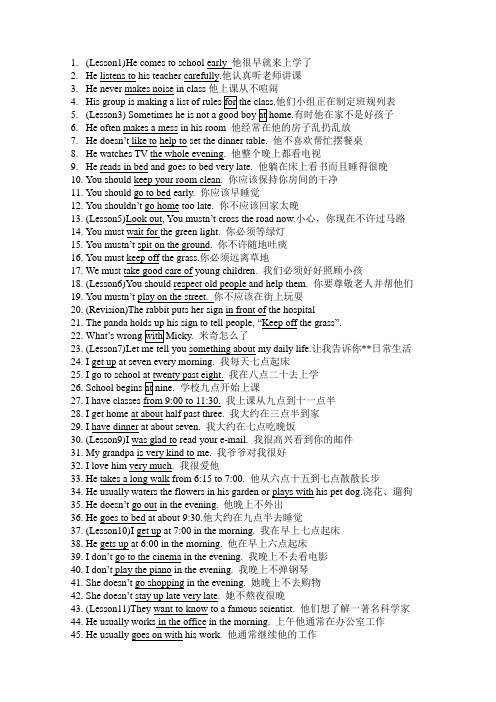
1.(Lesson1)He comes to school early 他很早就来上学了2.He listens to his teacher carefully.他认真听老师讲课3.He never makes noise in class4.他们小组正在制定班规列表5.有时他在家不是好孩子6.He often makes a mess in his room7.He doesn’t like to help to set the dinner table. 他不喜欢帮忙摆餐桌8.He watches TV the whole evening. 他整个晚上都看电视9.He reads in bed and goes to bed very late. 他躺在床上看书而且睡得很晚10.Y ou should keep your room clean. 你应该保持你房间的干净11.Y ou should go to bed early. 你应该早睡觉12.Y ou shouldn’t go home too late. 你不应该回家太晚13.(Lesson5)Look out, Y ou mustn’t cross the road now.小心,你现在不许过马路14.Y ou must wait for the green light. 你必须等绿灯15.Y ou mustn’t spit on the ground. 你不许随地吐痰16.Y ou must keep off the grass.你必须远离草地17.We must take good care of young children. 我们必须好好照顾小孩18.(Lesson6)Y ou should respect old people and help them. 你要尊敬老人并帮他们19.Y ou mustn’t play on the street. 你不应该在街上玩耍20.(Revision)The rabbit puts her sign in front of the hospital21.“Keep off the grass”.22.What’. 米奇怎么了23.(Lesson7)Let me tell you something about my daily life.让我告诉你**日常生活24.I get up at seven every morning. 我每天七点起床25.我在八点二十去上学26.27.I have classes from 9:00 to 11:30.28.I get home at about half past three. 我大约在三点半到家29.I have dinner at about seven. 我大约在七点吃晚饭30.(Lesson9)I was glad to read your e-mail. 我很高兴看到你的邮件31.My grandpa is very kind to me. 我爷爷对我很好32.I love him very much. 我很爱他33.He takes a long walk from 6:15 to 7:00. 他从六点十五到七点散散长步34.He usually waters the flowers in his garden or plays with his pet dog.浇花、遛狗35.He doesn’t go out in the evening. 他晚上不外出36.He goes to bed at about 9:30.他大约在九点半去睡觉37.(Lesson10)I get up at 7:00 in the morning. 我在早上七点起床38.He gets up at 6:00 in the morning. 他在早上六点起床39.I don’t go to the cinema in the evening. 我晚上不去看电影40.I don’t play the piano in the evening. 我晚上不弹钢琴41.She doesn’t go shopping in the evening. 她晚上不去购物42.She doesn’t stay up late very late. 她不熬夜很晚43.(Lesson11)They want to know to a famous scientist. 他们想了解一著名科学家44.He usually works in the office in the morning. 上午他通常在办公室工作45.He usually goes on with his work. 他通常继续他的工作46.有时候他会见其他科学家47.He seldom goes shopping. 他很少去购物48.He never eats out.49.He always has his meals in the office, or even in the lab. 总在办公室或实验室吃50.How hard he works! 他工作好勤奋啊51.We should learn from him. 我们应该向他学习52.(Lesson13)Do you like collecting stamps? 你喜欢收集邮票吗53.你喜欢听音乐吗54.55.56.在皮特家福建有一个玩具店57.我喜欢收集邮票58.. 我有一个有趣的爱好59.(Lesson15)My grandpa lives on a farm. 我爷爷住在农场60.He has some interesting hobbies. 他有一些有趣的爱好61.He enjoys farming. 他喜欢干农活儿62.He enjoys planting flowers and growing vegetables. 他喜种花和种菜63.He also likes keeping animals. 他还喜欢养动物64.My grandpa also enjoys fishing.我爷爷还喜欢钓鱼65.Is he good at fishing. 他擅长钓鱼吗66.He goes fishing for the whole day but catches nothing.整天钓鱼却一无所获67.(Lesson16)My grandpa enjoys making tools. 我爷爷喜欢造工具68.My grandpa’s hobby is raising animals. 我爷爷的爱好是养动物69.Gao Wei’s mother likes cooking. 高威的妈妈喜欢烹饪70.My uncle’s hobby is collecting CDs. 我叔叔的爱好是收集碟片71.Lisa’s brother enjoys playing with toy cars. 丽莎的弟弟喜欢玩玩具车72.Our teacher’s hobby is reading books. 我们老师的爱好是看书73.(Lesson17)Bob’74.他经常通过画画来做一些趣味事75.他现在想示范怎样做叶画76.77.然后描绘初叶子的轮廓78.用另一些叶子用同样的事情79.当你完成了画画80.Now you can make your own leaf paintings. 现在你可以做自己的叶子画了81.取一些颜料和白纸82.在白纸上画一间房子83.84.给房子涂不同颜色并剪下来85.把它粘到纸上86.Look! We have a nice pictures. 看,我们有一幅漂亮的图画了87.用手指蘸一下涂料88.把手指按在纸上做一个手指印89.Draw animals’ and children’90.Look! We have finger paintings.。
最新冀教版小学英语六年级上册《Lesson 10 How Many Are There?》
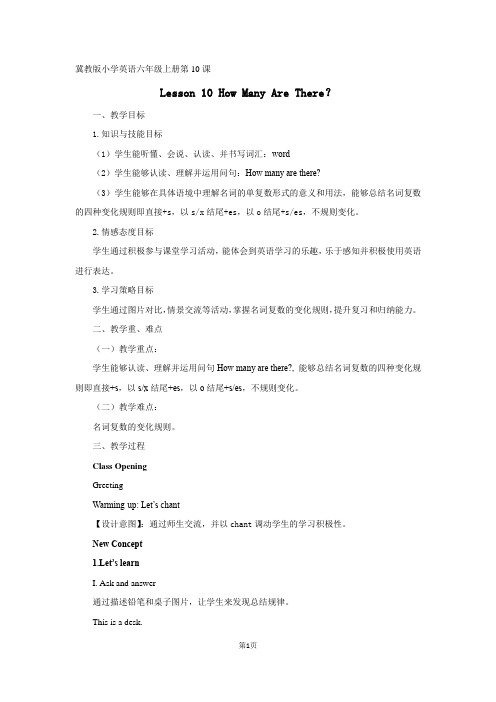
冀教版小学英语六年级上册第10课Lesson 10 How Many Are There?一、教学目标1.知识与技能目标(1)学生能听懂、会说、认读、并书写词汇:word(2)学生能够认读、理解并运用问句:How many are there?(3)学生能够在具体语境中理解名词的单复数形式的意义和用法,能够总结名词复数的四种变化规则即直接+s,以s/x结尾+es,以o结尾+s/es,不规则变化。
2.情感态度目标学生通过积极参与课堂学习活动,能体会到英语学习的乐趣,乐于感知并积极使用英语进行表达。
3.学习策略目标学生通过图片对比,情景交流等活动,掌握名词复数的变化规则,提升复习和归纳能力。
二、教学重、难点(一)教学重点:学生能够认读、理解并运用问句How many are there?, 能够总结名词复数的四种变化规则即直接+s,以s/x结尾+es,以o结尾+s/es,不规则变化。
(二)教学难点:名词复数的变化规则。
三、教学过程Class OpeningGreetingWarming-up: Let’s chant【设计意图】:通过师生交流,并以chant调动学生的学习积极性。
New Concept1.Let’s learnI. Ask and answer通过描述铅笔和桌子图片,让学生来发现总结规律。
This is a desk.How many are there?These are many desks.II. Look and say.通过描述盒子和公交车的图片,让学生来发现总结规律This is a box.These are many boxes.【设计意图】:通过对比发现不同之处并总结。
这种方法培养了学生自主学习的能力。
小结既完整的呈现了教材文本,更给予学生学习策略的引导2. Let’s practice!I. Look and guess.Are these …?Maybe they are …(也许)They are oranges.They are peaches.They are watermelons【设计意图】:由猜图的方式引起兴趣,发散学生的思维,为最后总结归纳做准备。
六年级英语上册 知识点 冀教版(三起)
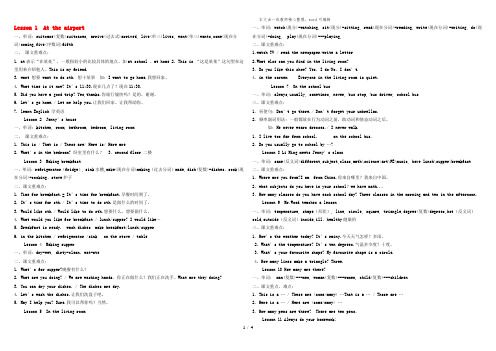
Lesson 1 At the airport一、单词:suitcase(复数)suitcases, arrive(过去式)arrived, live(单三)lives, want(单三)wants,come(现在分词)coming,five(序数词)fifth二、课文重难点:1. at表示“在某处”,一般指较小的比较具体的地点。
如at school 、at home2. This is “这是某某”这句型在这里用来介绍他人。
This is my friend.3. want 想要 want to do sth. 想干某事如:I want to go home.我想回家。
4. What time is it now? It’s 11:30.现在几点了?现在11:30.5. Did you have a good trip? Yes,thanks.你旅行愉快吗?是的,谢谢。
6. Let’s go home./ Let me help you.让我们回家。
让我帮助你。
7. learn English 学英语Lesson 2 Jenny’s house一、单词:kitchen, room, bathroom, bedroom, living room二、课文重难点:1. This is / That is / These are/ Here is/ Here are2. What’s in the bedroom? 卧室里有什么? 3、second floor 二楼Lesson 3 Making breakfast一、单词:refrigerator(fridge), sink水槽,make(现在分词)making(过去分词)made, dish(复数)-dishes,cook(现在分词)-cooking、stove炉子二、课文重难点:1. Time for breakfast.= It’s time for breakfast.早餐时间到了。
六年级英语上册素材-Lesson 3 It will be sunny this Sunday课文翻译 科普版

Lesson 3 It will be sunny this Sunday第三课这个星期天会是晴天单词表cloudy ['klaudi] 多云的windy ['windi] 有风的place [pleis] 地方strong [strɔŋ] 强壮的,强烈的rain [rein] 雨;下雨lake [leik] 湖earth [ə:θ] 地球change [tʃeindʒ] 改变wind [wind] 风dry [drai] 干的full [ful] 满的bring about 带来,引来be bad for 对……有害full of 充满课文翻译Let’s talk让我们谈谈(D=dongdong, L=Lulu)(D =东东,L =露露)D: It’s nice outside, isn’t it?外面天气很好,不是吗?L: Yes, it is.是的。
D: What will the weather be like tomorrow?明天天气会怎么样?L: It will be cloudy and windy.将会多云而且有风。
D: Will it be cold?天气会冷吗?L: Yes, it will. But it’ll be sunny this Sunday.是的,会的。
但是这个星期天会是晴天。
D: That’s good. I think it’ll be warm, too.那很好。
我想天气也会暖和的。
L: Yes, I think so.是的,我想是的。
D: What are you going to do this Sunday?这个星期天你打算做什么?L: I’m going to see my grandpa. And you?我要去看我爷爷。
你呢?D: I’m going to play football.我打算去踢足球。
Listen and say听和说(L=Lili, J=John)(莉莉,约翰)L: Hi, John! The winter holiday is coming. What are you going to do?你好,约翰!寒假就要到了。
- 1、下载文档前请自行甄别文档内容的完整性,平台不提供额外的编辑、内容补充、找答案等附加服务。
- 2、"仅部分预览"的文档,不可在线预览部分如存在完整性等问题,可反馈申请退款(可完整预览的文档不适用该条件!)。
- 3、如文档侵犯您的权益,请联系客服反馈,我们会尽快为您处理(人工客服工作时间:9:00-18:30)。
Unit 10 My Class
Lesson Three
(一)大声读单词:
1. bun v. 小圆面包
2. far adj. / adv. 远
(二)重点词汇:
1. far adj. / adv. 远
要点:far from
How far is it from your o ffice to the bank? 你的办公室离银行多远?
(三)重点语法:
形容词性物主代词,虽然名字很复杂,但是用起来非常简单。
意思就是“谁谁谁的”。
(1)形容词性物主代词用作“定语”,其后一定跟名词。
my fans 我的歌迷our school 我们的学校
your sunshine 你的阳光
his so ngs 他的歌her smile 她的笑容
their teachers 他们的老师
(2)形容词性物主代词不能与“an, a, the” 连用。
Tha t is a book.
That is my book.
(3)形容词性物主代词与形容词连用时顺序:形容词性物主代词+形容词。
my English teacher 我的英语老师
her older brother 她的哥哥
用心爱心专心- 1 -。
